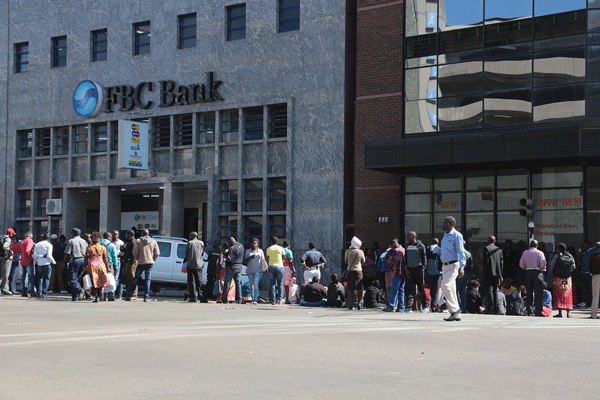
[ad_1]
GOVERNMENT must solve the ongoing cash shortages as a matter of urgency. The crisis is causing chaos and long winding queues at most banking institutions.
When people work, they expect to withdraw their money from banks without restriction or breaking sweat. There is no need for people to suffer for what they worked for.
We are all aware that things are slipping out of control all over the country, and President Emmerson Mnangagwa’s government is behind all this.
It is painful to see people, men and women, struggling to get what they worked for.
Government must address these problems as soon as possible because the people cannot take the pain anymore.
Addressing issues of confidence requires national convergence around a political and economic reform agenda for Zimbabwe.
Open up the economy and increase the injection (supply) of United States dollars into the economy.
- Chamisa under fire over US$120K donation
- Mavhunga puts DeMbare into Chibuku quarterfinals
- Pension funds bet on Cabora Bassa oilfields
- Councils defy govt fire tender directive
Keep Reading
This is where the policy matrix of Zimbabwe has to change in order to attract foreign direct investment and fresh capital.
Without any stonewalling, government must address the people’s concerns.
As a matter of emphasis, the main obstacle is the confidence crisis which requires a political solution. –Silence Raki
Let’s humiliate Mnangagwa in 2023
PRESIDENT Emmerson Mnangagwa has repeatedly told the nation that the voice of the people is the voice of God.
But events on the ground tell us a different story. We know that anyone who has tried in the past to tell Mnangagwa to listen to the voice of the people has been dealt with harshly or violently.
So, which people is Mnangagwa talking about? Former Chivi South legislator Killer Zivhu was expelled from the ruling Zanu PF party for suggesting that MDC Alliance leader Nelson Chamisa and Mnangagwa should dialogue.
He even suggested that Mnangagwa’s wife, Auxillia, and Chamisa’s wife, Sithokozile, should meet first and pave way for their husbands’ talk.
Mnangagwa must not mislead us. He must tell the nation that we are going nowhere, whether we like him or not.
Those who have tried to oppose his party and government from outside have been dealt with ruthlessly, examples being investigative journalist Hopewell Chin’ono who has been in and out of prison on trumped-up charges for exposing corruption.
Opposition activists such as Harare West MP Joanah Mamombe, Cecilia Chimbiri and Netsai Marova were arrested on allegations of violating COVID-19 lockdown measures after staging an alleged illegal demonstration in Harare sometime last year.
They were hunted like animals, beaten up, abused, tortured, prosecuted and continue to be persecuted because his administration was under pressure and feared their influence would grow such that his popularity would wane ahead of the 2023 elections.
Ordinary people in rural and urban areas have suffered the worst as punishment for supporting opposition parties and people demanding that Mnangagwa address to their plight.
In the past, some people have been killed, abducted and tortured, denied food aid and displaced simply because of their support for the MDC Alliance. –Stanley Dhunha
Zimbabwe has become replica of Rhodesia
THE birth of Zimbabwe and many other African States came as a result of violent confrontations.
Negotiations like the ones at Lancaster House Conference took place after a violent confrontation between the guerilla fighters and white supremacists.
Among the issues at the centre of the Second Chimurenga were the land question, totalitarian rule by the whites and oppression of the black populace.
The dastardly acts of the Ian Smith regime were unbearable. It is also important to note that the regime’s oppressive nature did not go unnoticed as Britain and the United Nations imposed sanctions on Rhodesia.
Fast-forward to 2000 and beyond, Zimbabweans find themselves in a similar situation. The issue of land became the crux of the battle.
Words like terrorists and puppets began to be thrown around with reckless abandon against the opposition and dissenting voices.
The government of the day has failed to cut the umbilical cord of colonialism. They have become a replica of the Smith regime.
They have perfected the art of oppression, interchangeably using violence, draconian laws to maintain a tight grip on power.
Given the fact that most people in the government of Zimbabwe fought for the liberation of the country against the oppressive Smith government, it only makes sense that they learned the oppressive style of government from the very system they fought against.
It is ironic that the Zimbabwean government is becoming a black version of the Smith government, thereby, vindicating an apt assessment by Frantz Fanon when he said that what changed after the independence of most African States was the skin colour of the oppressor.
But as a generation, we have a duty — a generational mandate, a generational obligation — to fight the system.
We have to demand accountability, good governance and respect of the rule of law. There is much that unites us than divides us.
We should never engage in violence because that’s what the regime that we are fighting wants.
It has survived and thrived on violence, that’s its forte.
But we are smarter than it, we are a different generation.
We should be alive to the dangers of imitating our oppressors and we should not make the same mistakes the previous generation made. –Dadirai Nguva
[ad_2] Source link










